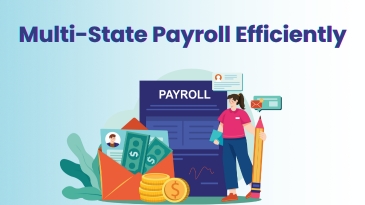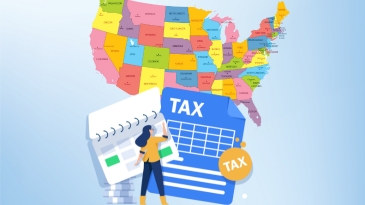
Many companies manage complex Multi-State Payrolls. Operating in different states allows their businesses to expand and grow. Examples include Walmart and McDonald’s. These companies follow state rules. They adjust taxes and regulations. Operating in states helps them grow. They reach more customers easily. Companies hire workers from anywhere. This boosts their overall success.

These companies can hire workers from any state. It becomes easier to find the right talent for their needs. This flexibility in hiring and reaching new markets boosts their overall success.
In this blog, we will explore handling multi-state employee payroll. We’ll focus on Payroll Tax Compliance across States. Managing taxes and supporting business growth is key. Reducing errors is important for success. Understanding these basics helps businesses navigate payroll complexities. This improves overall efficiency and operations.
What is Multi-State Payroll?
Multi-state payroll is the process of managing and processing payroll for employees who work in different states.
Each state has its own rules for taxes and wages. Companies must ensure that they follow the rules of every state they operate in. They are responsible for taking out taxes correctly, and paying workers properly. Multi-State payroll can be complex. To stay compliant, one needs to stay updated on regulations in each state they operate. It’s essential for staying legal and avoiding penalties.
Challenges of Multi-State Payroll / State-Specific Payroll Challenges

Each state has its regulations and laws. Due to this, managing payroll across multiple states presents various challenges.
- Payroll Tax Laws for Multiple States-
Each state has its own tax rates and rules for income tax, unemployment insurance, and other taxes. This means that businesses need to calculate different withholding amounts for employees. This depends on where they work or reside, making payroll processing more complex. - Different Minimum Wage Rates:
States set their minimum wage. This may differ significantly from the federal rate. Some cities or counties also have higher local minimum wages. Employers need to be aware of these rates. They must ensure that they comply with the highest applicable wage for their employees. - State-Specific Benefits and Leave Laws:
States have varying requirements regarding employee benefits, such as sick leave, paid family leave, and health insurance. For example, California requires certain benefits that other states do not, so businesses need to track and comply with these state-specific requirements. - Unemployment Insurance:
Unemployment insurance rates and eligibility vary by state. Companies must make contributions to state unemployment insurance funds based on the state where the employee is located. Failing to comply can lead to penalties and an increased rate of contribution. - Local Tax Regulations:
In some states, there are local or municipal taxes in addition to state taxes, creating further complexity. Employers must stay on top of the local tax rules for every location where they have employees to ensure correct tax withholding’s.
- Workplace Laws:
Labor laws regarding overtime, breaks, and employee classifications can differ from state to state. For example, some states require paid sick leave, while others do not. Businesses must ensure they follow the specific laws of each state to avoid legal trouble. - Remote Work Complications:
With the rise of remote work, employers may have employees located in different states, each with its own set of payroll regulations. Companies must navigate how to handle taxes and compliance for employees working outside the company’s base state. - Reporting and Filing Deadlines:
Each state may have different deadlines for payroll tax reporting and payments. Missing these deadlines can result in fines, penalties, or interest charges. Employers need to stay organized to meet all the required deadlines.
Managing Payroll in Multiple States



Handling Multi-State Employee Payroll can be a tough task. However, it is essential to stay compliant with multi-state payroll. Here are some steps you can take to manage payroll:
- Understand State-Specific Laws-
Ensure that you know the tax rules for each state where your employees work or reside. - Use Payroll Software or Services-
Many payroll systems can automatically calculate state taxes, and withholding’s, and comply with local tax rules. You can use a payroll service provider that specializes in multi-state operations. - Track Employee Locations-
Make sure you have records of where each employee lives and works. This will inform you about where taxes should be withheld and which state-specific laws apply. - Set Up State-Specific Payroll Accounts-
Register with tax agencies in each state where your employees work. You may need to set up:
A state payroll tax account,
Unemployment insurance account,
Other relevant registrations. - Track Local Taxes-
Some cities or counties have their own tax rules. Some states have local income taxes. Track these taxes and include them in payroll calculations. - Employee Benefits Across States-
Benefits such as paid leave, sick days, or health insurance may differ between states. Make sure to track the benefits policies for each location. - Ensure Timely Filing and Payments-
Different states have different deadlines for tax filings and payments. Set reminders to ensure you meet all state and federal deadlines. It is better to avoid penalties. - Consult Tax Experts or Professionals-
You might have a large number of employees across multiple states. Consider consulting with payroll experts, accountants, or legal professionals. They can provide guidance to stay compliant and help with complicated state laws.
The Importance of Accurate Reporting

Accurate Reporting is essential:
- To maintain legal compliance with tax and labor laws. Incorrect reporting can lead to penalties, fines, or even legal action. This can damage a company’s reputation and financial health.
- To help businesses avoid audits. Stay in line with both state and federal requirements.
- To allow companies to calculate and remit the correct amount of taxes, avoid overpaying, and ensure accurate deductions.
- To give businesses a clear picture of their financial duty. This is important for maintaining a strong financial position.
- To maintain trust with employees. There might be conflict due to over- or under-payment. This can lead to frustration and a lack of trust in the company.
- To help businesses respond quickly and efficiently to audits.
- To boost a company’s credibility and reputation.
- To maximize tax benefits and reduce their tax liabilities.
The Future of Multi-State Payroll Compliance

The future of multi-state payroll will evolve significantly. Technology will play a big role. Payroll software will automate tax calculations. This will help businesses stay compliant. More employees will work remotely in different states. Companies will need to track these locations. Remote work will add complexity to payroll. States will continue changing their tax laws. Businesses will need to keep up. State-specific benefits and leave laws will increase. Companies must adapt to these changes. Payroll systems will become more advanced. They will help manage multiple state laws. Data security will be more important. Companies will need to protect sensitive information. Businesses that embrace technology will succeed. They will efficiently handle multi-state payroll challenges.
Real-Life Examples of Multi-State Payroll in Action
Amazon
It has distribution centers, warehouses, and offices in multiple states. Employees work in various states with different tax laws. Amazon’s payroll system ensures tax compliance. Each state’s tax rules are followed closely.
McDonald’s
It has locations in various states. Payroll is calculated based on state rules. Minimum wage and tax rates differ by state. They use technology for accurate payroll processing.
Walmart
It operates across all 50 states. It manages payroll in each state. Different tax rates and laws apply nationwide. Walmart uses advanced payroll systems for compliance.
Starbucks
It operates nationwide with employees in all states. They manage payroll by state-specific minimum wage laws. Each state’s tax rules are carefully followed.
Conclusion
In conclusion, managing a multi-state payroll can be challenging. It requires businesses to stay organized and informed. Every state has unique tax laws and regulations. These variations make payroll management more complex. To handle this, automation is highly beneficial. Payroll software can simplify multi-state calculations and reporting. It reduces errors and saves significant time.
Companies must stay updated on changing state laws. Tax rates, benefits, and wage laws often change. Keeping up ensures compliance and avoids penalties. Tracking employee work locations is also crucial. This helps in applying the correct tax withholding’s. Remote workers add complexity to payroll systems. However, proper tools can handle remote work regulations easily.



Regular audits of payroll processes are essential. These help identify any errors or compliance risks. By reviewing reports, companies ensure accurate tax filings. Missing deadlines can lead to fines or interest charges. Organizing payroll schedules helps avoid such issues. Accurate reporting also strengthens trust with employees.
Data security is another important factor. Companies must protect sensitive payroll information. Using secure payroll platforms ensures employee data is safe. Consult tax experts when needed for complex issues. Professional guidance helps with specific state tax challenges.
In summary, efficient multi-state payroll management is achievable. By using the right tools and staying informed, businesses can maintain compliance. Automation, regular reviews, and professional assistance are key strategies. These practices ensure smooth payroll operations across multiple states.




